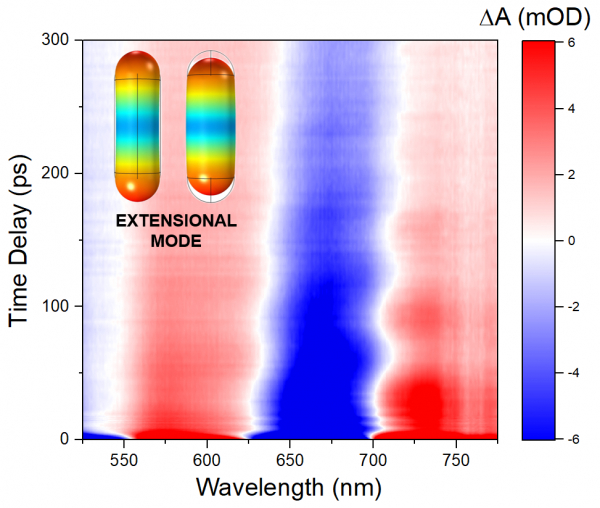Bimetallic Au/Ag core-shell cuboid nanoparticles (NPs) exhibit a complex plasmonic response dominated by a dipolar longitudinal mode and higher-order transverse modes in the near-UV, which may be exploited for a range of applications. In this paper, we take advantage of the strong signature of these modes in the NP ultrafast transient optical response, measured by pump-probe transient absorption (TA) spectroscopy, to explore the NP vibrational landscape. The fast Fourier transform analysis of the TA dynamics reveals specific vibration modes in the frequency range 15–150 GHz, further studied by numerical simulations based on the finite element method. While bare Au nanorods exhibit extensional and breathing modes, the bimetallic NPs undergo more complex motions, involving the displacement of facets, edges, and corners. The amplitude and frequency of these modes are shown to depend on the Ag shell thickness, as the silver load modifies the NP aspect ratio and mass. Moreover, the contributions of the vibrational modes to the experimental TA spectra are shown to vary with the probe laser wavelength at which the signal is monitored. Using the combined simulations of the NP elastic and optical properties, we elucidate this influence by analyzing the effect of the mechanisms involved in the acousto-plasmonic coupling.
Acoustic Vibration Modes of Gold–Silver Core–Shell Nanoparticles
The EFSL research group, in collaboration with the Laboratoire Lumière, Matière et Interfaces and the Laboratoire de Physique des Solides of Université Paris-Saclay (France) and with the Institut des Molécules et Matériaux du Mans of Le Mans Université, has published a paper in the Chemosensors journal. The title of the article is "Acoustic Vibration Modes of Gold–Silver Core–Shell Nanoparticles" by Tadele Orbula Otomalo, Lorenzo Di Mario, Cyrille Hamon, Doru Constantin, Francesco Toschi, Khanh-Van Do, Vincent Juvè, Pascal Ruello, Patrick O'Keeffe, Daniele Catone, Alessandra Paladini and Bruno Palpant.
https://doi.org/10.3390/chemosensors10050193







